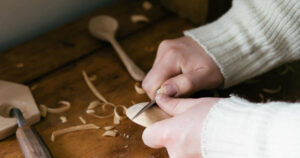It’s easy to fall into a bit of a slump when physical ailments keep you from spending your days the way you’d like. But healing rarely happens on our preferred timeline. So when surgery or an injury has you down, take the opportunity to try new things. Here are some ideas to get you started.
1. Read
The world is an adventure in the pages of a book. You can get into a popular fiction series or read about a subject you’re interested in from the nonfiction section. Short stories, plays, poems, and magazines are all options too. Audiobooks count as well.
2. Needlework
Make gifts or simply practice a new craft. Try out embroidery or get a counted cross-stitch kit at the craft store. Keep your hands busy with crochet or knitting. Practice sewing or quilt making. If you’re really bored, you could always work on the mending pile.
3. Take a Class
Speaking of learning new skills, when you’re laid up is the perfect time to delve into something with your full attention. Consider music, history, writing, math, interior design, or any other topic you’re interested in. There are many options online so sign up before surgery and make sure you have the materials you need.
4. Movie Marathon
Whether you’re up to date with the newest Netflix releases or you find you rarely have time to complete a show, movies and TV series help pass the time. You can watch documentaries for intellectual stimulation or delve into a list of movies you’ve always intended to see.
5. Work a Puzzle
Puzzles can be completed while sitting at a table. But if your recovery requires you to keep a leg in the air, you can still work small puzzles or work them in sections using a TV tray. Puzzle books work too so load up on word searches, Sudoku, and crossword puzzles.
6. Get Organized
Daily life is hectic. But when recovery slows things down, take advantage of the opportunity to get organized. While you might not be able to gut the pantry or reorganize your closet by yourself, you could with an extra set of hands to help. When you’re flying solo, you can clean out the recipe box and create a monthly meal plan, complete with ingredient lists. You could also use your time to put together picture albums, scrapbooks or digital frames. It’s also a good time to get your financial life in order. Pay bills, order checks, make a budget, and organize paperwork for the next tax season.
7. Papercrafts
Right along with scrapbooking, you can learn origami, make paper snowflakes with the kids, or design and put together greeting cards so you have them for every upcoming occasion.
8. Podcasts
There’s a podcast for just about every category of interest and they’re free with a smartphone app. Try a few. Look for science, history, business startup, comedy, quirky, self-help, and so much more.
9. Learn Magic
While the magic might not make you heal faster, it will help pass the time. Entertain yourself and others with some basic magic, including card tricks.
10. Wood Carving
If it’s within your restrictions, use those idol hands to create wood carvings. Start with soft balsa wood and move into pine or cedar once you master the basic technique. Try your hand at wooden toys, a keychain, or animal figurines.
11. Learn an Instrument
Again, you’ll have to see what works with your specific recovery, but if allowed, consider piano, guitar, harmonica, flute, or even the drums. There’s no time like the present.
12. Plan Ahead
Pinterest is the perfect time thief. Use it to collect ideas for future home improvement projects. Then research costs and create a timeline and budget for the projects on your wishlist. Similarly, use the time to plan out your next vacation, complete with budget and itinerary.
13. Journal
Even if your injury only has you laid up for a few days, keeping a journal will help you remember the date it happened and your state of mind during recovery. A journal after a major event can help you process emotions, keep you organized, and provide a record for medical professionals who ask about your experience.
14. Learn a New Language
Aprender español, apprends le français, or lerne Deutsch. Between podcasts, online resources, and language apps, there’s no better time to learn a second, or third, language.
15. Connect with a Community
It’s not easy to have your life turned upside down from an unexpected surgery or injury. Give yourself a break and surround yourself with others who know and understand what you’re going through. Identify online communities where you can find support. Also rely on the resources in your own community, such as your surgeon, family doctor, in-home nurse, physical therapist, mental health therapist, Doordash delivery, grocery delivery, and Uber drivers.
16. Meditate
Meditation is a learned skill. While you’re on the mend, use the time to become a student of the art. Start with short 1-5 minute guided meditations and work up to longer options. You’ll find a vast array of topics to meditate on, from stress reduction to sleep to healing. Check out Headspace or Insight Timer to get started.
17. Exercise
Once you’ve been given the green light to exercise, follow the guidance of your medical team. It might be simple movements in your chair or bed. For other injuries, exercise might mean walking short distances. Whatever it is, check with your physical therapist or doctor if you have any doubts about how or how often to perform the tasks. Also make contact if your condition worsens or you can’t keep pain under control.
Remember each hour and every movement brings you one step closer to healing so you can get back to other activities you’ve had to shelve in the short term.
